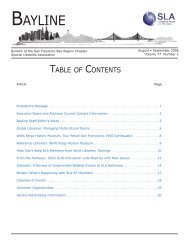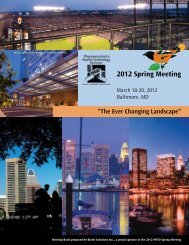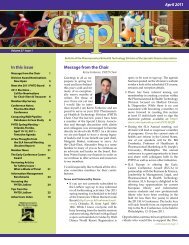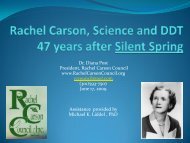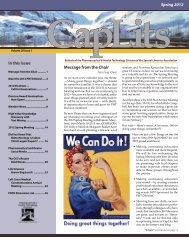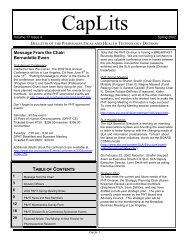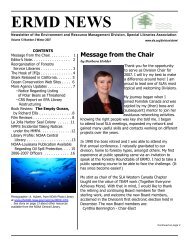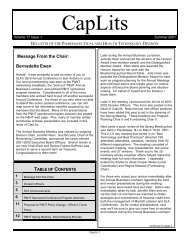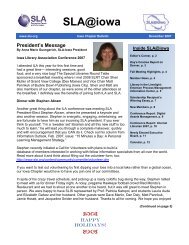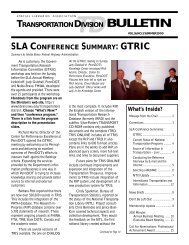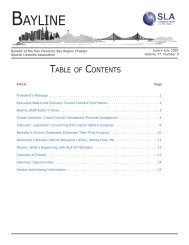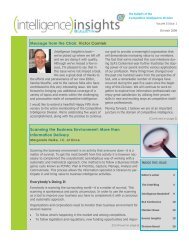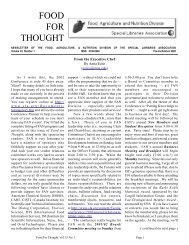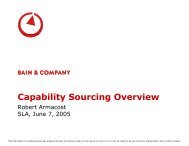Education Libraries - Special Libraries Association
Education Libraries - Special Libraries Association
Education Libraries - Special Libraries Association
You also want an ePaper? Increase the reach of your titles
YUMPU automatically turns print PDFs into web optimized ePapers that Google loves.
Nadean Meyer<br />
Learning Resources Librarian at Eastern<br />
Washington University<br />
9002 Sherman Rd. Spokane, WA<br />
509-443-8866-home, 509-359-4262-work<br />
billandnadean@earthlink.net nmeyer@ewu.edu<br />
Julie Miller is<br />
Associate Dean of <strong>Libraries</strong> at Eastern<br />
Washington University in Cheney, Washington.<br />
She has a Ph.D. in English Language and<br />
Literature and taught college English for several<br />
years. Since completing her library science degree<br />
at Kent State University in 1994, she has worked<br />
in public, special, and academic libraries. She<br />
currently serves on the Standards and<br />
Accreditation Committee of the <strong>Association</strong> of<br />
College and Research <strong>Libraries</strong>. Her professional<br />
interests include leadership and student<br />
engagement. Her passions include contemporary<br />
poetry and the American West. She is a member<br />
of Women Writing the West and has served as a<br />
judge in the annual WILLA award for literary<br />
works by women about the West.<br />
Julie Miller, PhD, Associate Dean of EWU<br />
<strong>Libraries</strong> at Eastern Washington University.<br />
Julie.miller@ewu.edu<br />
Information Literacy Resources<br />
National Forum on Information Literacy<br />
The National Forum on Information Literacy was<br />
created in 1989 as a response to the<br />
recommendations of the American Library<br />
<strong>Association</strong>'s Presidential Committee on<br />
Information Literacy. These education, library,<br />
and business leaders stated that no other change in<br />
American society has offered greater challenges<br />
than the emergence of the Information Age.<br />
http://www.infolit.org/<br />
Information Literacy meets Library 2.0<br />
This is the extensive and well organized blog of<br />
Peter Godwin and Jo Parker, authors of the book<br />
Information Literacy meets Library 2.0. They also<br />
have a location in Second Life.<br />
http://infolitlib20.blogspot.com/<br />
Pageflakes on Information Literacy<br />
This page has feeds from blogs on information<br />
literacy and related subjects, plus feeds from a few<br />
journals and discussion lists. It is maintained by<br />
Sheila Webber, University of Sheffield,<br />
s.webber@sheffield.ac.uk<br />
http://www.pageflakes.com/informationliteracy/<br />
University of Idaho Information Literacy<br />
Online Course<br />
Information literacy is critically important because<br />
we are surrounded by a growing ocean of<br />
information in all formats. Not all information is<br />
created equal: some is authoritative, current,<br />
reliable, but some is biased, out of date,<br />
misleading, false. The amount of information<br />
available is going to keep increasing.<br />
http://www.webs.uidaho.edu/info_literacy/<br />
Texas Interactive Library Tutorial:<br />
Information Literacy<br />
Information is available from many sources and in<br />
many formats, such as printed text, television,<br />
videos, library databases, web sites, and more. To<br />
be "information literate" you need to know why,<br />
when, and how to use all of these tools and think<br />
critically about the information they provide.<br />
Visitors can take this tutorial as a Guest.<br />
http://tilt.lib.utsystem.edu/<br />
<strong>Education</strong> <strong>Libraries</strong>, Volume 31, No. 2, Winter 2008 30



